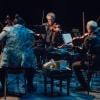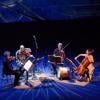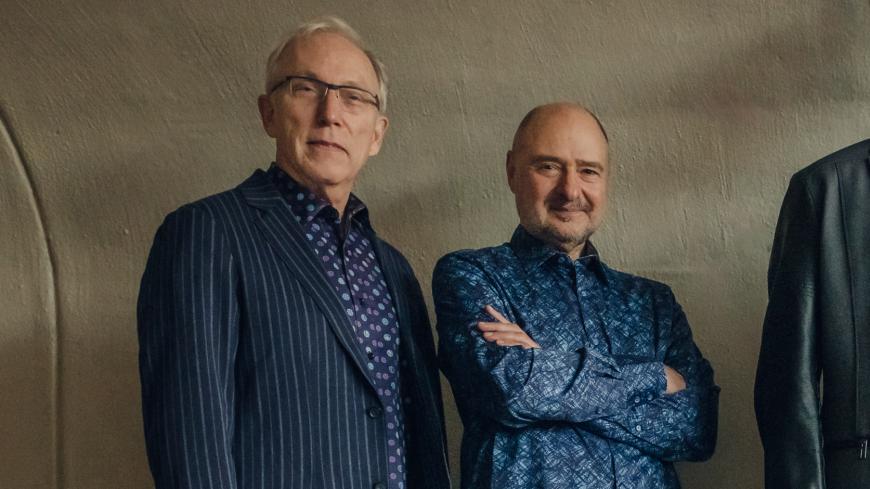
Throughout its 50 years, the Kronos Quartet has followed its musical curiosity as well as its heart, both of which will resonate through the four days of this week’s annual Kronos Festival at the SFJAZZ Center, running June 20–23. Along with a showcase of repertoire transcending boundaries of geography, genre, culture, and history, there’ll be a heartfelt finale by and tribute to two retiring players, violist Hank Dutt and violinist John Sherba, who joined Kronos in 1977 and 1978, respectively.
Raised in Illinois, Dutt studied music at Indiana University and Kansas State University. Starting violin in public school in Wisconsin, Sherba enrolled at the University of Wisconsin-Milwaukee; before joining Kronos, he performed in a quartet with his brother Charles. Having committed to Kronos in their mid-20s, both Dutt and Sherba have spent practically their entire professional lives with the ensemble. In an extended Zoom session, Dutt, 71, and Sherba, 70, shared with SF Classical Voice their reflections on that shared experience. They also discussed this week’s festival and what lies ahead for them and for Kronos.
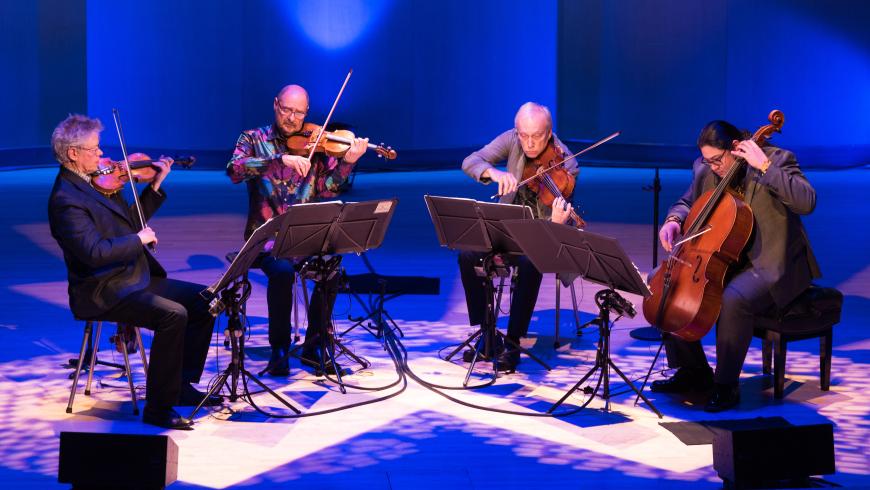
Does the timing of your leaving have anything to do with this being Kronos’s 50th season, or is that coincidence?
Dutt: It has a lot to do with it for me. I’m getting older — but also, I knew the 50th season would be incredible. And Janet [Cowperthwaite, the ensemble’s longtime manager and executive director of the Kronos Performing Arts Association, who’s also retiring this year] had suggested I stay on for this wonderful season. We’ve been playing in incredible halls around the world for the last time for me. I’ve gotten to see old friends and family in different ports and in a way to say goodbye to the audiences.
Does it work that way for you, John?
Sherba: Yes, I’m happy I did the 50th. But traveling four and a half months out of the year, and doing all the preparation, was just too much for me. I want to plow through my 70s and my 80s and hopefully through my 90s, and the only way to be able to do that and maintain my health is lessening the challenges.
Dutt: I was just going to add that when you’re traveling, even with the best intentions and plans, something always goes wrong, and so you end up with a lot more hours on the road. And that’s hard on your bones at this age.
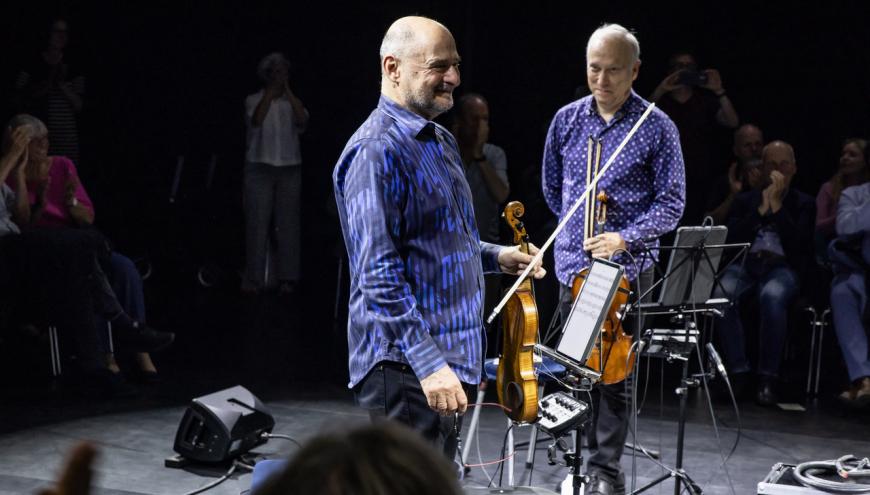
Sherba: Also, I definitely want to spend more time with my family. I have a wonderful grandson, who’s 3, and I have another one on the way in September. So I said to my wife, “I don’t want you to have all the fun!”
Will the fun include making music in other settings?
Dutt: I hope to do some interesting projects but in a less stressful way. I played a recital quite a while ago, and I learned a lot from it; I wouldn’t mind doing another. Some composers have written some things for me, and that might be interesting to showcase. And I was thinking, maybe I should record.
Sherba: There are some composers I want to contact and [who] want to contact me. I still love working with the freshness of a new score.
Will being on your own affect your daily practice routine?
Dutt: That’ll be telling. There’s nothing like a deadline to make you practice, as John and I both know. [Chuckles.] When you’re in a group, you’re working and working and working, and it will be good to just play, to be in a situation where I can just enjoy something a little more. Although I’ve loved performing in Kronos and it will be sad for me to leave in that regard.
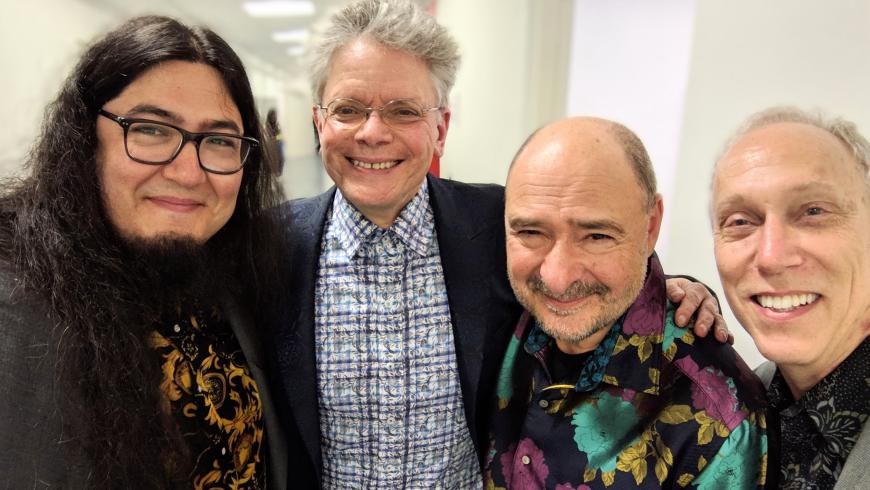
Sherba: Being in Kronos over the years has been an incredible experience. We’ve played in every major hall across the world, not once but many times, and we’ve met incredible composers. To be in Kronos, you have to be naturally very curious as well as very hardworking, and those traits are in my genes; I had them when I was 4 years old. And I love to practice. I love the feeling of having my violin under my chin and my fingers moving on the fingerboard. [Laughs.] People say, “What are you going to do after the last day of the festival?” And I think I’m probably going to open up my violin case at 8 a.m., take out my violin, and do some scales and some etudes. But with a little more free time, I’ll actually be able to work on certain things that I don’t do well. I can always work on my pitch!
What else will be taking up your time?
Sherba: My wife signed me up for tai chi classes. She’s been doing it, and she said, “Now you can join me.” I’ve been very involved myself with chi kung, so it seems a natural progression. Also, I haven’t seen that many Shakespeare plays, and now I’ll be able to. When you have a curiosity, it leads you to other things.
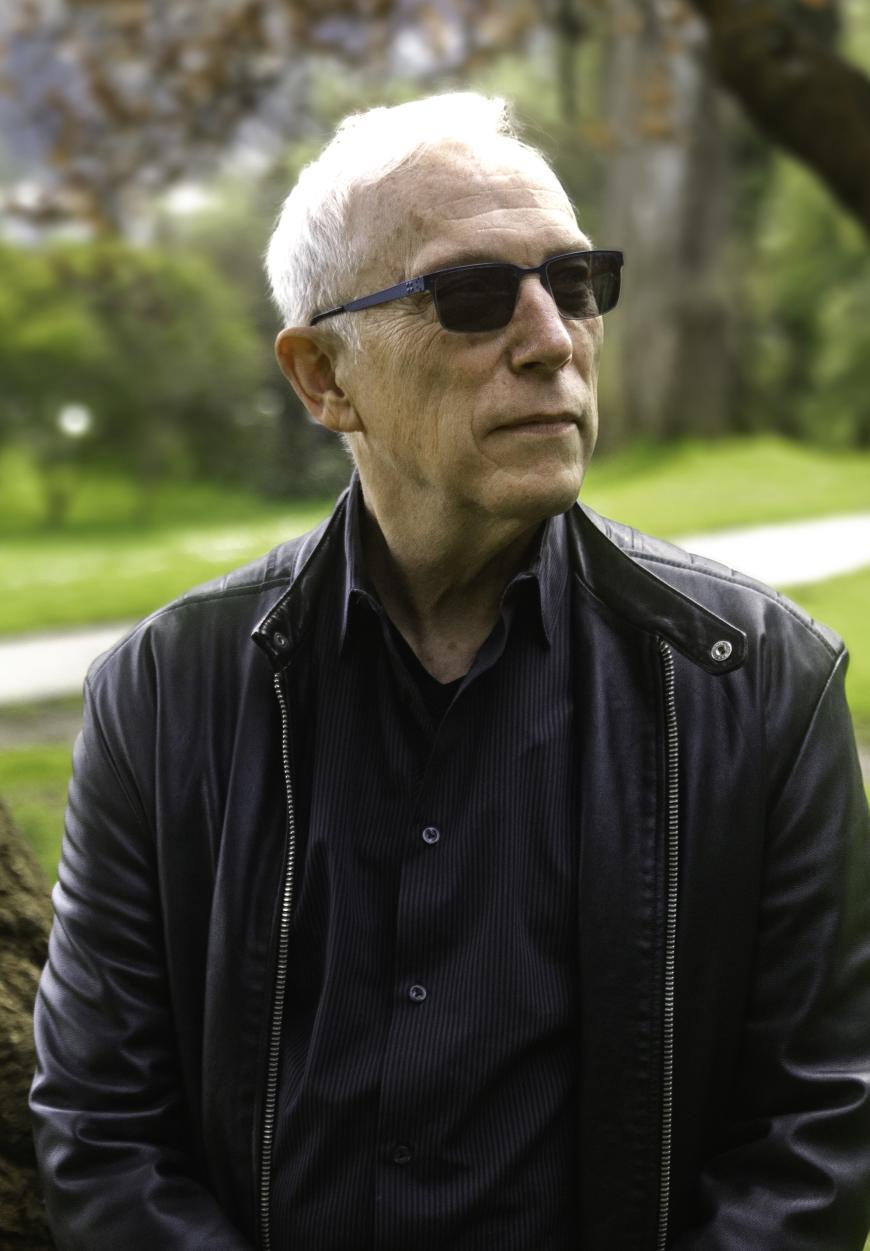
Dutt: Being in Kronos for so many years, we’ve been able to coach different groups at different universities and in different settings — more so in the last four or five years. I know, John, that you coached at Brown [University], and I think we both enjoy that aspect [of] passing on the knowledge of working with a long-standing quartet. So this is something I look forward to continuing.
Sherba: We have a couple of young students. I would love to see what happens to their playing and if I could make a difference.
Is there any call for you to break in your replacements in Kronos, Ayane Kozasa on viola and Gabriela Díaz on violin? Did you have anything to do with choosing them?
Dutt: I’d talked with Ayane about it, and I recommended her. I knew her playing, and she’d been on some of our trips to Europe, so I think it was sort of a natural development. But already, [Kronos cellist] Paul [Wiancko, Kozasa’s husband] had been playing with Ayane in another group, Owls. There’d actually been a married couple in [Kronos] during my first year, Walter and Ella Gray, but they had two kids, and we were making so little money that they decided to leave. And with those two openings, John joined, as did [cellist] Joan [Jeanrenaud].
Sherba: The new violinist, Gabriela, is a great player and lives in the Boston area. My brother’s wife, Consuelo Sherba, a violist, was in a group, Aurea, with Gabriela, so she knew her well, and that’s wonderful. But I wouldn’t want to have anything to do with breaking her and Ayane in with Kronos. I want to see their own personalities flower.
Dutt: I was going to say, I already told Ayane, “You don’t need any advice from me; you’re already a great player. But if you ever want to talk about anything, I’m there.” With the “50 for the Future” project, we’ve heard a lot of young quartets play our music, and that’s how music should be — it’s fluid. You don’t want to straitjacket anybody into how to play a piece.
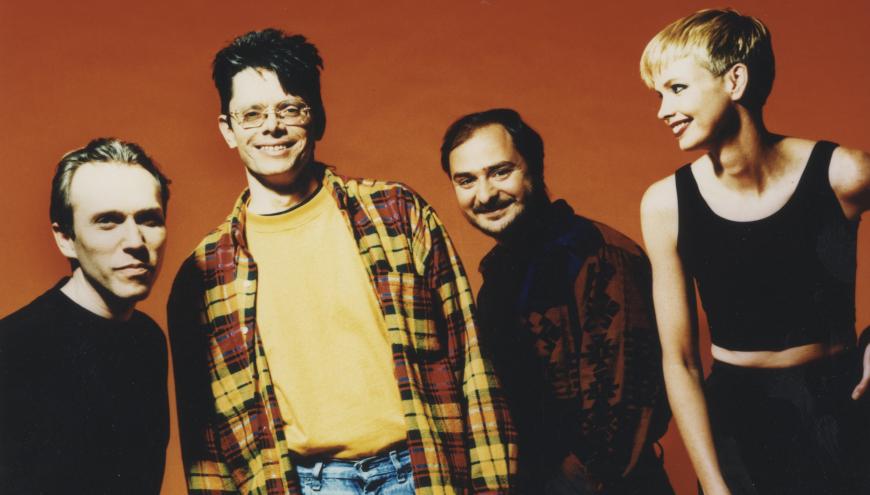
Would you want to take credit for what you’ve each contributed to Kronos?
Sherba: Everything is so integrated in the Quartet [that] it would be hard to think, “John brought this.” The answer might be that in every single rehearsal we’ve ever done, I hope there’s something I suggested that worked.
Dutt: Rehearsals have not been run by just one person; it’s a community event. You’re all both students and teachers. We had a very interesting philosophy where we allowed anyone to say anything they needed to say, with respect for the person saying it — for example, about a particular musical passage. In terms of community, I don’t know if you’re aware that Kronos’s archives are going to the Library of Congress.
I saw the announcement of that in April, along with the placement of Kronos’s Pieces of Africa album in the National Recording Registry and [Kronos founder and violinist] David Harrington’s appointment as the library’s Kluge Chair in Modern Culture. What a set of honors!
Dutt: Well, we’re both involved. I’m Kronos’s music librarian, and John is the audio librarian; he has all the tapes. So I’ve been going through the archives, and I came across the [Alban] Berg Lyric Suite and the Opus 3 [String Quartet], and I said, “Oh, I remember this. I haven’t seen it in a long time.”
How will the archives at the library function as a resource?
Dutt: I want to point out that we’re giving our individual parts to the library. And as you know, as a musician, you’re always writing in phrasings and bowings and fingerings, so a player will be able to look at that and see how the music is going and follow along with a recording.
Sherba: For composers of all ages, it’s going to be an incredible place to go visit and open up composers’ scores and see how they wrote.
Dutt: For me, the big thing was seeing George Crumb’s manuscript of Black Angels, where the score is like a work of art. It was a window into his working process.
Back when you joined Kronos, what did it do to your conception of chamber music?
Dutt: That first year, we played on the streets, in restaurants, every gig we could possibly play if anybody wanted to hear us. It was a chance to try out the repertoire we’d just practiced. At that time, new music kind of had a bad name, like you had to have a Ph.D. to understand what was going on onstage. We were curious [about how] there were really a lot of different types of new music that you could really make an interesting program out of. A lot of people wouldn’t hire us, but those who did would hire us back, and we just got more and more popular.
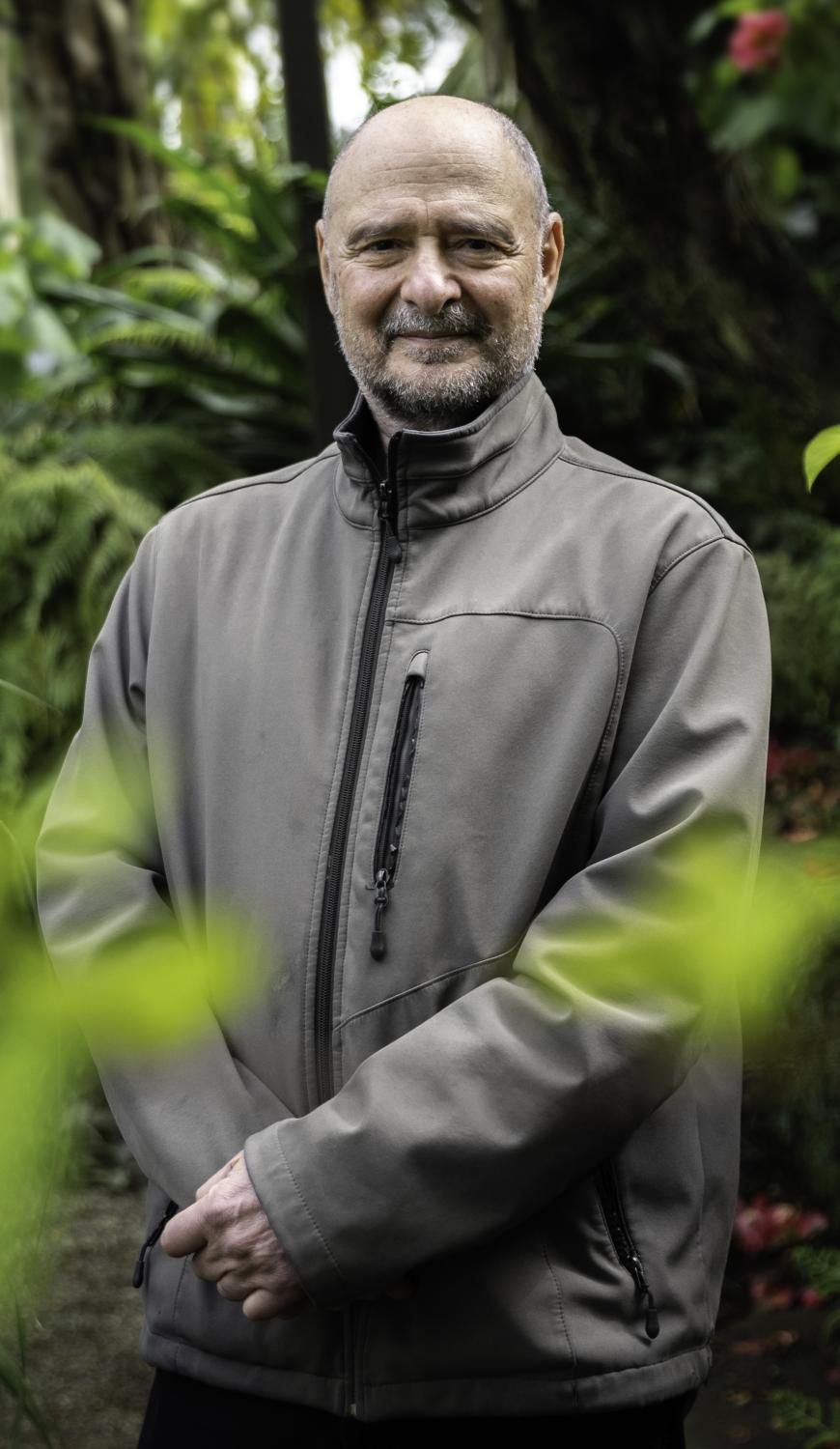
Having taken up an almost lifelong residence with Kronos, do you feel looking back that you came to the right place?
Sherba: For me, it’s been a dream come true. Some of my most memorable moments have been when I’m onstage and have a rest and am able to listen to everyone else.
Dutt: I’ve always loved the viola sound in a quartet, how it fits, and I love everyone we’ve played with here. We’ve had membership changes, and it was difficult to have those, but it was always another person to relate to who would have a new perspective about music. So it’s been a growing experience for me through the years. Last year, when we played for our 50th anniversary at Carnegie Hall, for the last piece, a Terry Riley work, we had 50 people onstage — our colleagues from other quartets and composers — and the admiration and respect they gave us was really so heartwarming [that] it was almost hard for me to play at first. And the audience means much more to me now this season than it has in the past.
How do you think the audience will be heralding you at the festival at SFJAZZ?
Dutt: The festival will have three nights of different programs, and on the afternoon of the next day, there’s a wonderful documentary-style piece on John and me. We play, and there’s a narrator and a film. It’s going to be summing up our tenure in Kronos. There are interviews with us and with composers. And we’ll have a big party after the concert. Maybe there’ll be cake. [Chuckles.]
Sherba: In the film, there’s a lot of early photographs of the group, and for people who have followed us all these years and are maybe approaching our age, it’ll be a great time. The audience might see the early photographs and see us onstage and think, “They’ve been through a lot.” [Chuckles.]
Dutt: The documentary kind of shows the inner workings of a quartet. It isn’t just colleagues we have, it’s wonderful friends. Each of us has been through hardships and also wonderful successes. So having shared that [and having] been consoled and supported when things happened that were unfortunate in life [makes] leaving Kronos like leaving family. And that family’s not just the Quartet but also Janet and the staff. For me, it’s bittersweet.
Any chance you’ll be invited back?
Dutt: We wouldn’t want to come too soon and upset the apple cart. But Joan [Jeanrenaud] came back once to play with us in a quintet in New York, and it was lovely. That was after several years. So who knows?


